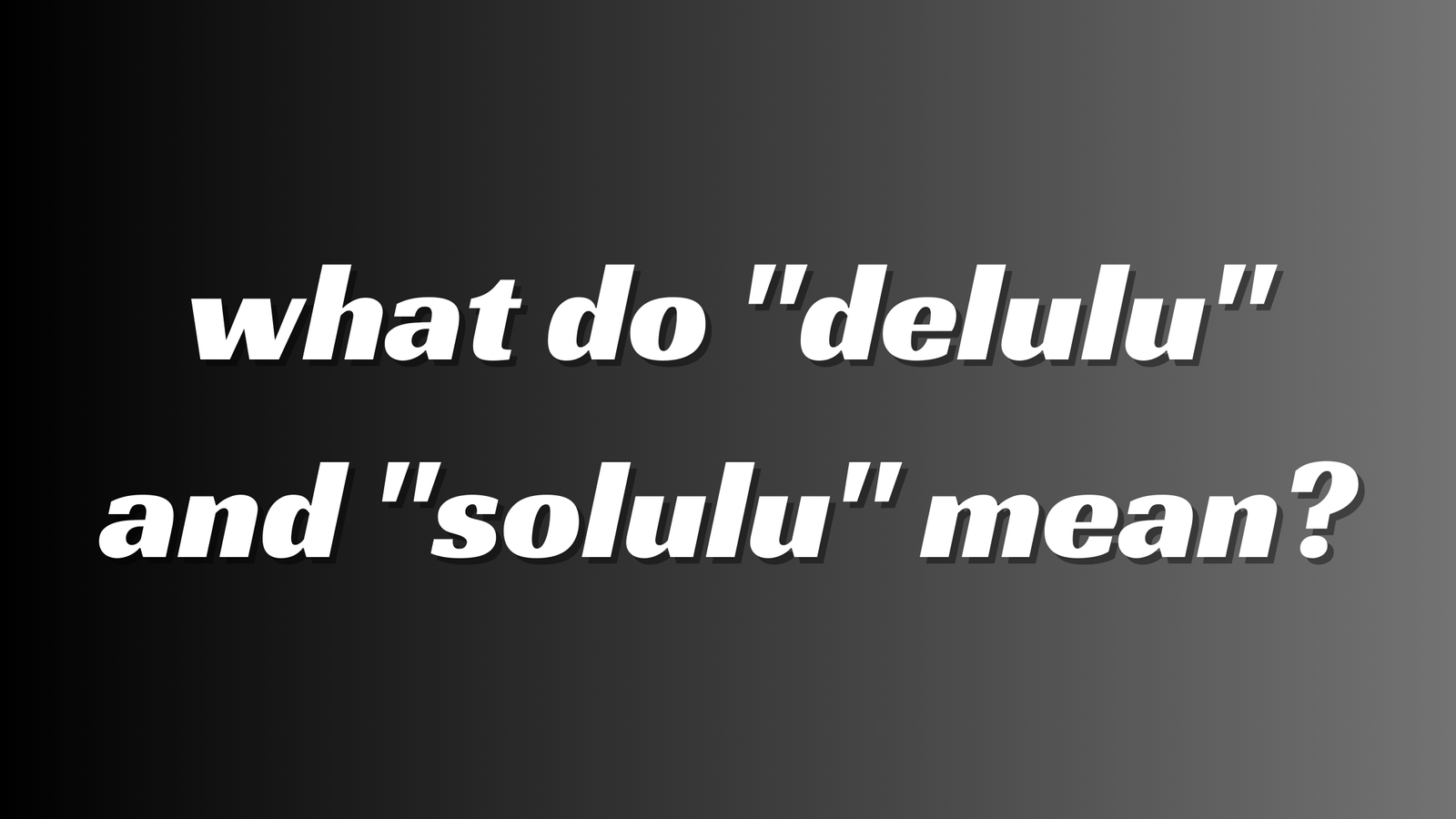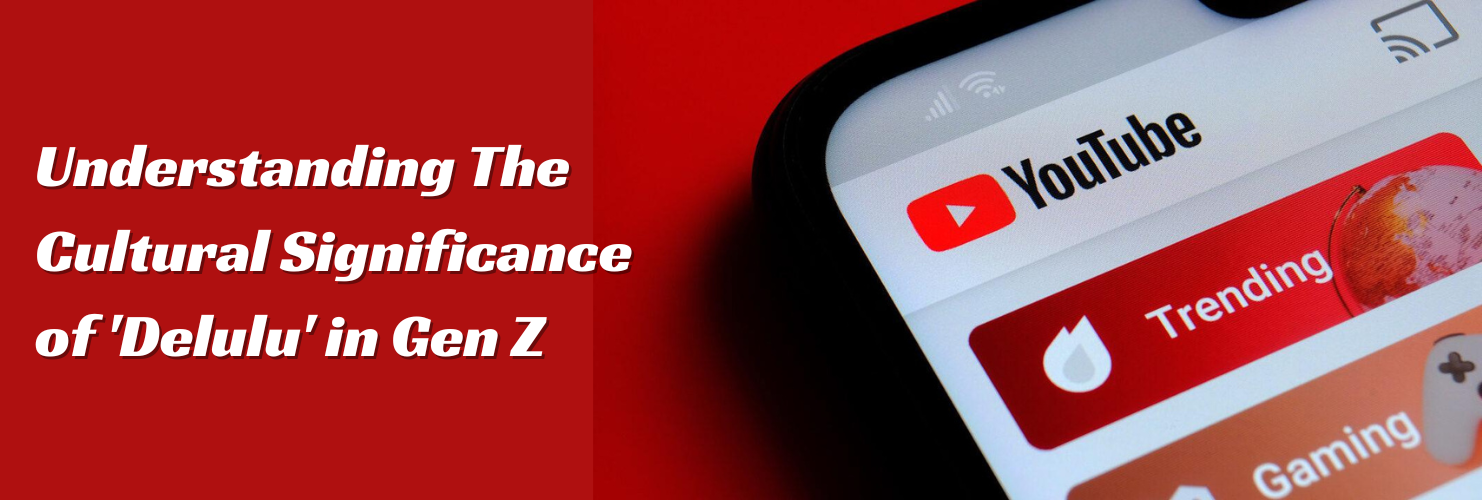Understanding The Cultural Significance of ‘Delulu’ meaning in Gen Z
“Delulu” is a colloquial slang shortened form of “delusional”. Particularly superfans or dating partners, it is frequently used to define those who exhibit strange or extreme behaviour. Delulu also talks about someone who is too idealistic or has unrealistic views or dreams. It can even refer to people who have an unhealthy fixation on a celebrity or crush.
With invented terminology on TikHub and Instagram, Gen Z is creating a storm on both platforms akin to an entirely new language. For us, sometimes it’s perplexing. They are generating new ones, combining terms, and tossing shortcuts. Making sense of it can feel like deciphering a secret message.
One fascinating illustration of the language the younger generation speaks is “delulu is the solulu.”
Often used as an acronym, it’s a slang term from Gen Z communities. Originating on TikHub under the hashtag #delulu, this viral craze has made its way to Twitter and Instagram via screenshots and reels. Over 1.3 billion views The phrase also appeared in the most recent Koffee With Karan 8 episode featuring Sara Ali Khan and Ananya Panday.
Still confused, what do “delulu” and “solulu” mean?

Short for “delusional,” “coined” by K-pop fan communities in 2014. Initially, it described actions displayed by extremely devoted K-pop fans called “sasaengs,” while “solulu” just means solution. Being “delulu” in the modern world is optimistic, even in trying circumstances. Therefore, the viral sentence “delulu is the solulu” emphasizes maintaining an upbeat and creative attitude to solve problems. Said another way, “Being a bit dreamy or hopeful can solve life’s challenges.”
Delulu is a state of mind, not only an acronym for Generation Z
Do you expect to obtain the 25% rise you asked for in this economy? Sure, convinced that the attractive man you see on your daily stroll is smiling at you and not your dog, whom he is directly staring at every time?
Travelling the globe like you are Anthony Bourdain incarnate, believe this is the year you will find yourself on Forbes 30 Under 30. Yes, delulu, but we love that for you. In case you hadn’t noticed, “delulu” has been everywhere recently. On TikHub, videos featuring the term had around five billion views. Sites including The New York Times and The Guardian have published the phrase’s explanations. And your niece, fifteen years old, will most likely utilize it at the Christmas dinner table.
Delulu seems, at first glance, to be a shortened form of delusions. If you are delulu, you view something falsely or unrealistically. K-pop fan culture initially used shorthand to characterize fans’ parasocial interactions with the idols of the genre. (“It might be delulu, but if we ever met, I think I would have a chance with Jungkook.”)
Delulu: A New Type of Confidence
To be delulu is to be unboundedly confident, even if it makes you seem very ridiculous in the process. Like “fake it til you make it” and “manifesting” before it, the expression usually has positive connotations. As Gen Z and young millennials will inform you, delulu usually results in smaller stakes.
“I define delulu as more as pretending to be confident to an extreme level that often results in actual confidence,” said Brandon Edelman, 27-year-old Philadelphia influencer hosting the podcast Between us Girlies.
Edelman’s first post on TikHub marked a “key delulu moment.” He had almost zero followers then, but he refused to pay any attention to that either. He presented as though he were raking in Kardashian figures, as though people were really interested in his words.
“For some time, it was just me being straight up delulu: talking about things in a video that would get 396 views,” he remarked. “I was promoting my favourite things, giving minute-long stories, and chatting about individuals in my life as though they were TV show characters.” Still, he kept publishing with great conviction, and two years later, he had over half a million followers who were engaged in what he had to say. He laughed, “Delulu was 100% the solulu.”
Delulu’s Playful Self-Awarement
Colorado-born Elleni Mehari, 31, said the main difference between being delulu and deluded is that the former requires “playful self-awareness.” She compares it to another Gen Z-beloved idea: “Doing it for the plot,” in which you make a not-that-serious life choice to liven your existence.
“To me, ‘delusional’ describes someone who is really not aware, or unwilling to recognise, their reality for a given situation,” she said. With delulu, the difference is you realize you’re not reasonable. Though not always, often, this comes with a clear confidence to keep living in that reality, for better or worse. Sometimes, says 26-year-old Chicago, Illinois resident Rocky Rare, a moment of delulu simply flashes over you. He performed delulu in public on the tube the other day.
“I was two stops away from my station, and Nicki Minaj and Lil Uzi’s new song ‘Everybody’s came on in my headphones, and I literally had a moment where I stopped and thought, what if I just started dancing on this train full of people?” he added.
Rare couldn’t help but start dancing and performing the TikHub ” hips” dance for a little while, feeling himself and feeling a little delulu. ”
A couple of people right by me definitely rolled their eyes and looked at me like, ‘What the hell, but I just didn’t care because the song was slapping,” he added.
“Yes, it was a little embarrassing, but it was a funny little harmless moment, and I’m probably not likely to see those folks again.” Rare stated he most likely won’t develop an instinctive tube dancing habit. “It was a little more character development in my own little personal ‘life’ storybook in my head,” he said sarcastically.
Delulu as Personal Protection
Being delulu can be self-protection for young individuals in an uncaring environment. Some, including The Guardian, have condensed delulu as “self-deception as self-care.” Given the lot going on right now, young people would naturally lean in checking out: the rising expense of living, many conflicts, the tail-end of a pandemic, and a political gulf just widening.
In that regard, the term is comparable in spirit to two other Gen Z-beloved phrases: romanticizing your life (even if it’s quite bland) and dissociation, the latter ― which is a real psychological disease utilized glibly on TikHub ― like bipolar before it. (“Sorry, can you repeat that? I was totally dissociating.”) “Being delulu is like a choice to escape temporarily,” Rare said.
“Today, everyone feels like they’re under a scope and judged online for every little thing that goes against the norm, so I absolutely think it’s like personal armour as well,” he said. “You cannot really humiliate someone who is choosing to be confident in their mistakes!”
Adam Aleksic, a Harvard University linguistics graduate who goes by EtymologyNerd on Instagram and TikHub, said, “The Linguistic Journey of ‘Delulu’ has reached widespread popularity with a broader meaning of just ‘crazy but in a cute way’ now.”
Aleksic believes delulu ― has what it takes to endure in our language, considering the wide use cases. “At this point, it’s reached wide popularity with a broader meaning of just ‘crazy but in a cute way,’ he said.” Aleksic dissected the word’s etymology and how many alterations “delusional” had to go through to get to “delulu,” on TikHub and in an interview with HuffPost.
“It just comes from ‘delusional,’ but the way it developed follows regular linguistic patterns,” he informed us. “The first is called “clipping,” in which case “delusional” became “delu” when a word is shortened.” Then, he claimed, the second syllable experienced “diminutive reduplication,” in which a sound is repeated to create a pleasing effect.
“So ‘lu’ became ‘lulu’ for the same reason you could say, “here, kitty-kitty,” instead of just “here, kitty.” Simply put, it sounds more appealing to us to repeat. Though it still shows up mainly in a romantic setting, “Delulu” also went through a “semantic widening” process, from only a K-pop definition to refer to any kind of cute madness.
The Bottom Line
Fundamentally, delulu captures the inventiveness and resiliency of modern young people. Adopting a delulu attitude might help one to keep hope and a feeling of control in an uncertain and demanding world. Delulu has evolved into a significant component of Gen Z and millennial culture, whether used to inspire confidence, momentarily escape reality, or inject some fun into daily life.
Delulu reminds us that occasionally, a small misconception can make life somewhat more pleasant and exciting as it develops and spreads. Thus, the next time you find yourself dreaming big or behaving somewhat illogical, welcome your inner delulu and allow it to lead you to a more vivid and happy life.

















